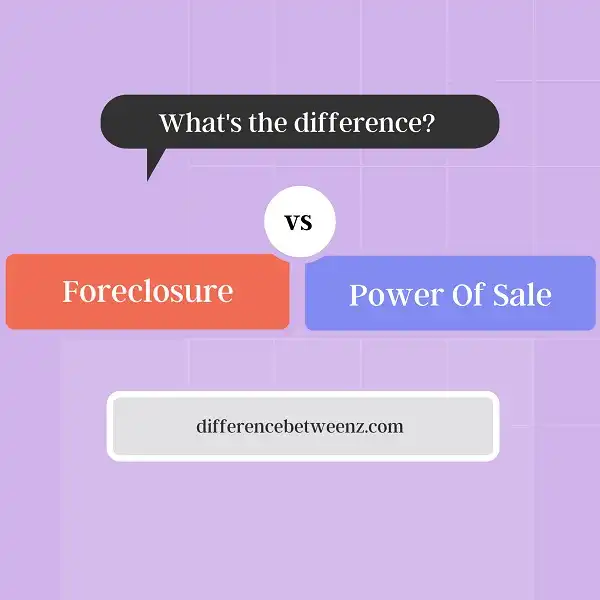When you’re facing foreclosure, it’s important to understand the difference between foreclosure and power of sale. Foreclosure is a legal process in which the lender tries to take back your home through a court order. Power of sale, on the other hand, is an administrative process in which the lender sells your home to recover its debt.
What is Foreclosure?
Foreclosure is a legal process in which the bank or lender that holds a mortgage on a property takes possession of the property when the homeowner is unable to make payments. This can happen for various reasons, such as financial hardship or job loss, and typically results in the homeowner having to find somewhere else to live. Though foreclosure can be a difficult and stressful process, it is important to keep in mind that there are resources available to help homeowners facing this situation. For instance, many communities offer financial assistance to homeowners who need support during the foreclosure process. Additionally, there are legal services available to assist with navigating this complicated process and ensuring that homeowners’ rights are protected throughout the process. Ultimately, while foreclosure may seem like an overwhelming experience, it is important not to give up hope and to take advantage of all available resources in order to get through this tough time.
What is Power Of Sale?
- Power Of Sale is a legal process that allows a lender to sell a borrower’s property in order to recoup the outstanding balance on a loan. In most cases, Power Of Sale is used when a borrower has defaulted on their mortgage payments. The sale of the property is typically conducted at a public auction, and the proceeds from the sale are used to pay off the outstanding balance on the loan.
- While Power Of Sale can be a useful tool for lenders, it can also be a stressful and difficult process for borrowers. In many cases, borrowers are not aware that their lender has the right to initiate Power Of Sale until after they have defaulted on their payments. This can often lead to borrowers being caught off guard and feeling overwhelmed by the entire process.
- If you are facing Power Of Sale proceedings, it is important to seek professional help as soon as possible. A qualified lawyer will be able to help you understand your rights and options and will work with you to develop a plan to protect your interests. With the right assistance, you can often avoid losing your home through Power Of Sale.
Difference between Foreclosure and Power Of Sale
- There are two main types of foreclosure: judicial and nonjudicial. In a judicial foreclosure, the lender (i.e., the bank or mortgage company) must file a lawsuit in order to foreclose on the property. In a nonjudicial foreclosure, the lender does not need to go to court in order to foreclose.
- Power of sale is a type of nonjudicial foreclosure. When a borrower defaults on their mortgage, the lender can sell the property at auction in order to recoup their losses. The power of sale provision is typically included in the mortgage agreement.
- One key difference between foreclosure and power of sale is that, with the power of sale, the borrower has no right to redemption. This means that, even if the borrower pays off the debt before the auction, they will still lose their property.
- Another difference is that, with foreclosure, the entire mortgage debt must be paid off before the property can be sold. With the power of sale, only the unpaid portion of the mortgage debt needs to be paid off.
- Foreclosure can be a long and complicated process, so it’s important to understand all of your options before you default on your mortgage.
Conclusion
Foreclosure and power of sale are two legal processes used to sell a property. The main difference between the two is that foreclosure is a judicial process, while the power of sale is an administrative process. If you are thinking about selling your property, it’s important to understand the differences between these two processes so you can choose the one that will work best for you.


